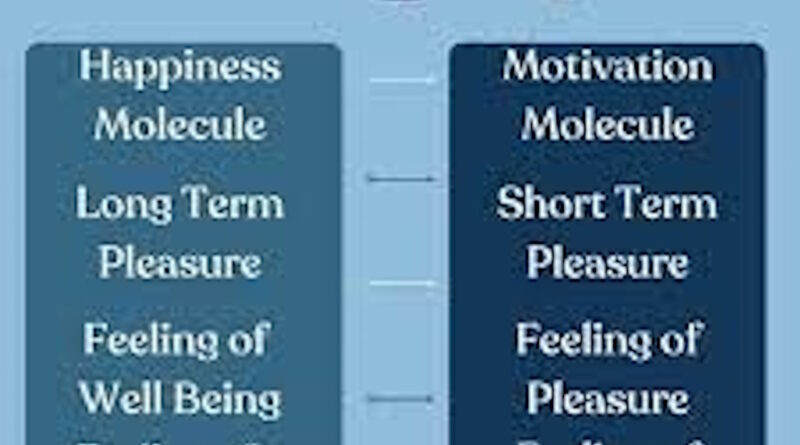Dopamine versus Serotonin
by Raquel Torres
 Dopamine and Serotonin are molecules that send signals throughout the body; these chemicals affect how we feel. When dopamine is released in our brain, we feel a sense of temporary pleasure. Serotonin, while similar to dopamine, creates a long-lasting feeling of happiness or well-being.
Dopamine and Serotonin are molecules that send signals throughout the body; these chemicals affect how we feel. When dopamine is released in our brain, we feel a sense of temporary pleasure. Serotonin, while similar to dopamine, creates a long-lasting feeling of happiness or well-being.
Both are also considered the “happy hormones,” as they both play a role in positive mood and emotion. Serotonin is associated with happiness, focus and calmness. Dopamine is associated with rewards and motivation. Dopamine and serotonin also share involvement in some mental health conditions, including depression and mood disorders.
Dopamine and serotonin also have some distinct functions. Dopamine controls body movements and coordination. Serotonin helps regulate digestive functions including bowel function and appetite. Dopamine causes a feeling of hunger while serotonin suppresses that feeling. Dopamine is mostly stored in your brain while serotonin is found mostly in your gut.
What is dopamine? – Dopamine is a brain chemical that is responsible for transmitting signals between nerve cells in the brain, as well as other functions. In this way, it directly affects our brain’s reward and pleasure centers, which in turn affects our mood.
Low levels of dopamine have been linked to Parkinson’s disease, restless legs syndrome and depression. Also low levels of dopamine can make you feel tired, moody, unmotivated and many other symptoms. Treatments are available for many of the medical conditions linked to low dopamine levels.
Symptoms of dopamine deficiency (low dopamine levels) may include:
● Lack of motivation or “the drive”
● Tiredness
● Can’t concentrate
● Moody or anxious
● Don’t feel pleasure from previously enjoyable experiences
● Depressed; feeling hopeless
● Trouble sleeping or have disturbed sleep
 How can I increase dopamine levels in a natural way? The Cleveland Clinic shares different ways to increase dopamine levels.
How can I increase dopamine levels in a natural way? The Cleveland Clinic shares different ways to increase dopamine levels.
● Engage in activities that make you happy or feel relaxed. This is thought to increase dopamine levels. Some examples include exercise, meditation, yoga, massage, playing with a pet, walking in nature or reading a book.
● Eat a diet that’s high in magnesium and tyrosine-rich foods. These are the building blocks of dopamine production. Tyrosine is an amino acid. It’s absorbed in your body and then goes to your brain, where it’s converted into dopamine.
Foods known to increase dopamine include:
● Chicken
● Almonds
● Apples
● Avocados
● Bananas
● Beets
● Dark Chocolate
● Green leafy vegetables
● Green tea
● Oatmeal
● Oranges
● Pumpkin seeds
● Tomatoes
● Turmeric
● Watermelon
● Wheat germ
What is Serotonin? – Serotonin in the brain regulates the mood. It’s often called the body’s natural “feel good”. Serotonin is another chemical that sends messages in our bodies. It tells the body how to work and helps control our happiness, memory, sleep, body temperature and hunger. Most serotonin is produced in our guts while some is produced in our brains. When you have average levels of serotonin in your body, you might feel focused, happy or calm. Low levels of this chemical might negatively affect your mood, sleep or digestive tract.
Serotonin plays a role in many of your body’s functions:
● Mood
● Digestion
● Nausea
● Sleep
● Wound healing
● Bone health
What problems are associated with low serotonin levels? The Cleveland Clinic shows in different researches that low levels of serotonin may be associated with many health conditions including:
● Depression and other mood problems
● Anxiety
● Sleep problems
● Digestive problems
● Suicidal behavior
● Obsessive-compulsive disorder
● Post-traumatic stress disorder
● Panic disorders
● Schizophrenia
Ways to increase serotonin levels include:
● Eating more tryptophan-containing foods
● Getting more sunlight
● Taking certain supplements
● Getting more exercise and lowering your stress level
● Foods to increase serotonin levels
 Many foods naturally contain tryptophan, the amino acid from which serotonin is made. You can try increasing your serotonin level by eating tryptophan-containing foods, such as:
Many foods naturally contain tryptophan, the amino acid from which serotonin is made. You can try increasing your serotonin level by eating tryptophan-containing foods, such as:
● Salmon
● Eggs
● Cheese
● Turkey
● Tofu
● Pineapples
● Nuts, oats and seeds
Eating foods high in tryptophan will not necessarily boost serotonin levels on its own. It’s a complex process. Your body needs carbohydrates to release insulin, which is needed to absorb amino acids. Then even if tryptophan does get into your blood it has to compete with other amino acids to get absorbed into your brain.
Summary – Having too much or too little of either neurotransmitter can cause psychological and physical symptoms. Deficiencies in both of these chemicals can lead to symptoms of depression and issues with eating, sleeping, and concentrating. Dopamine also affects the muscles, and low levels can cause tremors and difficulties with coordination.
Serotonin and dopamine levels can be boosted with lifestyle habits, such as getting more sunlight, exercising regularly, and following a healthy diet or with medications.
Photo of food tray with eggs, salmon and nuts by Nicola Barts from pexels.com

Raquel Torres, MBA is a USAT Elite Certified Coach, Professional Triathlon Coach and Professional Triathlete. Raquel also writes blogs for several magazines and her team Athletic Mentors. Since May 2021 she contributes as a columnist with CNY Latino Newspaper. She shares true life stories with her experiences, also tips and tactics that helps anyone to be their best version. To read about her, head over to cnylatinonewspaper.com and search for her by her name. You can also send questions or comments about her column to the following email: raquel@athleticmentors.com and go to her website at www.raqueltorres.org


